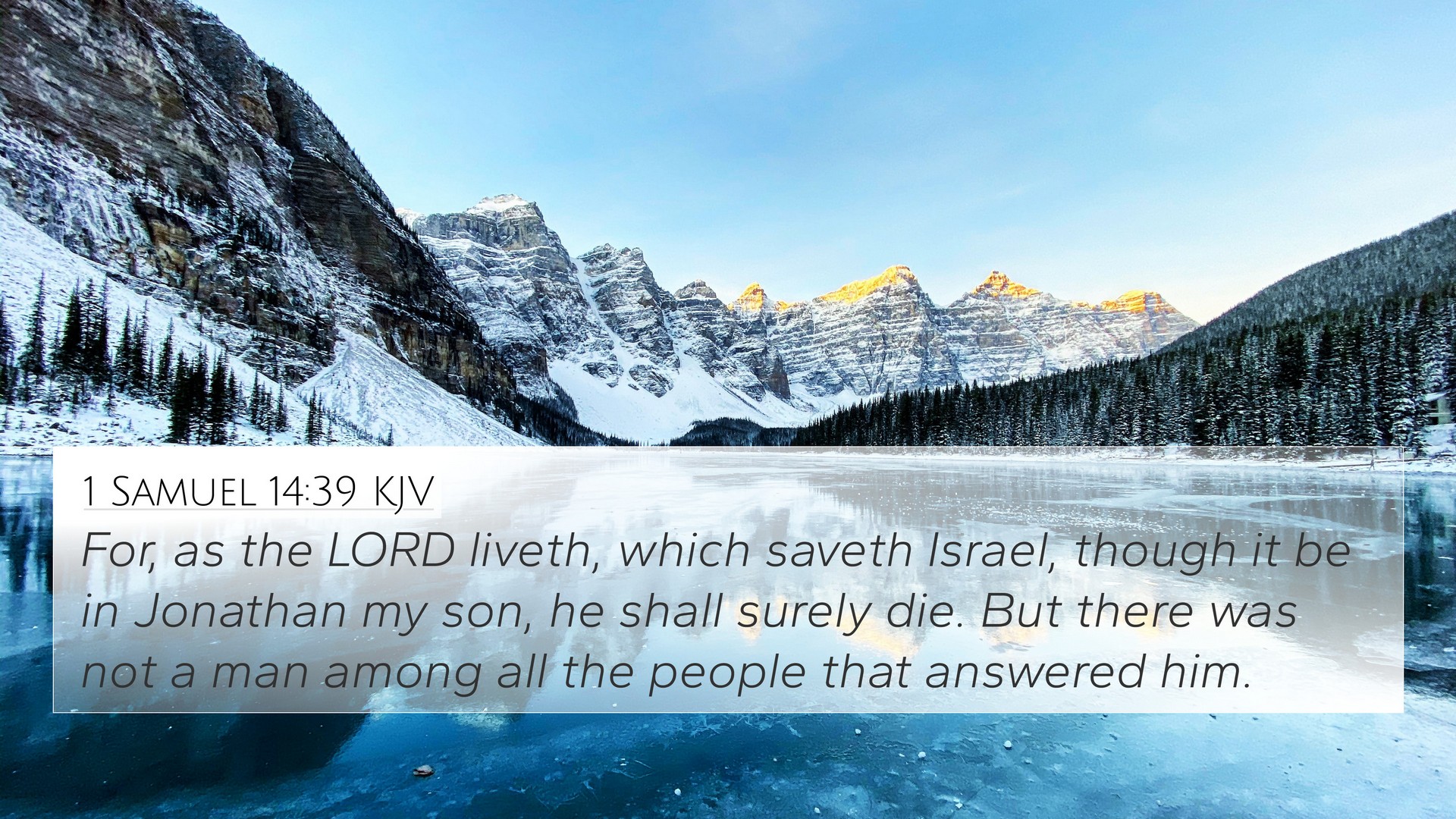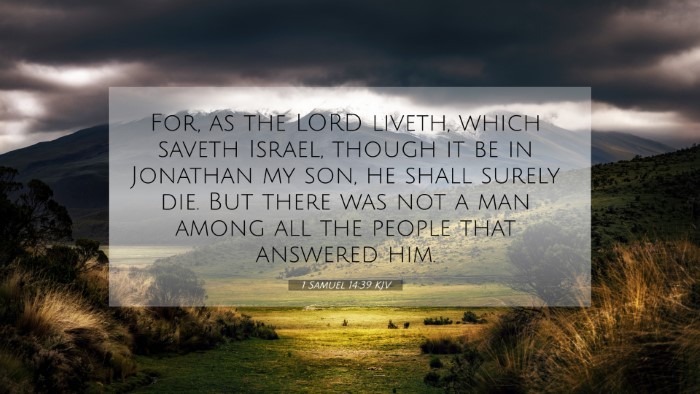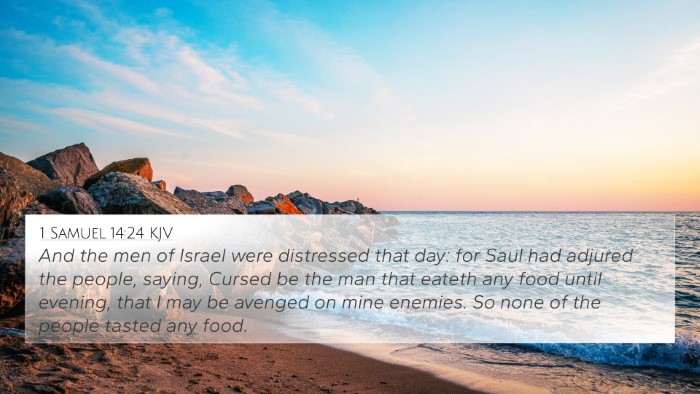Understanding 1 Samuel 14:39
Verse: "For, as the Lord liveth, which saveth Israel, though it be in Jonathan my son, he shall surely die. But there was not a man among all the people that answered him." (1 Samuel 14:39, KJV)
Overview of the Context
This verse is situated within a dramatic narrative concerning King Saul and his son Jonathan during a time of war with the Philistines. Saul has just made a rash oath condemning anyone who eats before he avenges himself on his enemies. Jonathan, unaware of his father's command, eats honey and subsequently faces the severe consequences of Saul's oath.
Commentary Insights
This verse highlights the complexities of leadership, the dynamics of familial relationships, and the dire consequences of hasty vows. Various public domain commentaries shed light on these themes.
Matthew Henry's Commentary
Henry notes that Saul's declaration reflects the intense nature of his leadership and the desperate conditions in which Israel found itself. His immediate declaration concerning Jonathan speaks to Saul’s inclination to prioritize his rash oath over the well-being of his son, thus revealing the tragic flaw in Saul's character.
Albert Barnes' Commentary
Barnes emphasizes the gravity of Saul's statement and the theological implications. He suggests that Saul’s decisions reflect a misguided sense of justice and the potential for personal bias to overshadow moral obligations. The fact that the people remained silent in the face of this proclamation shows the deep concern for Jonathan’s character and actions.
Adam Clarke's Commentary
Clarke offers insights on the severe nature of oaths in Biblical times, suggesting that the people understood the weight of Saul's words. He points out that Jonathan's inadvertent transgression could have devastating consequences, illustrating how often the innocent suffer due to the actions of the powerful and the folly of zeal without knowledge.
Theological Implications
The proclamation made by Saul serves as a crucial lesson in leadership ethics, particularly the importance of being cautious with one's words and the implications they carry. Leadership should involve discernment and the protection of those who are innocent, as opposed to the reckless adherence to oaths that can lead to tragedy.
Cross-References
- 1 Samuel 14:24: Illustrates Saul’s rash vow that led to the crisis.
- Proverbs 20:25: Discusses the dangers of making promises one cannot keep.
- James 5:12: Advises against swearing oaths, showing how it can lead to trouble.
- Matthew 5:34-37: Jesus teaches about the righteousness of keeping one’s word without the need for oaths.
- Numbers 30:2: Highlights the seriousness of vows and the accountability that comes with them.
- 1 Samuel 20:1-3: Jonathan’s relationship with David reflects trust and loyalty, contrasting Saul's approach.
- Psalm 69:5: A reflection of David’s lament, connecting with the theme of personal distress in leadership.
- Ecclesiastes 5:2: Warns against hastily uttering words before God, emphasizing the sanctity of speech.
- 1 Samuel 31:4: The eventual tragic fate of Saul parallels the consequences of leadership failures.
- Proverbs 17:27-28: Speaks to the wisdom in restraint and how foolishness leads to peril.
Connections Between Bible Verses
This verse can be linked through various themes across Scripture:
- Leadership and Responsibility: Both Saul and the later kings exemplify how poor leadership can lead a nation to spiritual failure (e.g., 2 Chronicles 33:1-9).
- The Role of the Innocent: The suffering of the innocent due to the guilt of the leaders (Jeremiah 2:14-19).
- Rash Vows and Their Consequences: The extension of the theme of rash declarations can be seen in the fate of Jephthah's daughter (Judges 11:30-31).
Bible Study Tools
For those engaging with this verse and others like it, utilizing tools for Bible cross-referencing can enhance understanding:
- Bible Concordance: A valuable resource for finding terms and themes across the text.
- Cross-Reference Bible Study: Techniques that connect various scriptures to provide deeper insight.
- Bible Reference Materials: These help identify passages that relate to specific themes or narratives.
Conclusion
1 Samuel 14:39 serves as a profound reminder of the complexities inherent in leadership and the often dire consequences of hasty decisions. By studying this verse alongside others, we can gain insights into the nature of our commitments, the importance of protecting the innocent, and the call to lead with wisdom. The inter-Biblical dialogue initiated by this verse offers a wealth of themes for meditation and application in contemporary life.
Further Reflections
Consider how the insights drawn from various commentaries and cross-references enrich your understanding of this passage. Reflect on the implications of Saul's leadership style, and how it contrasts with the ideal of leadership espoused in later teachings of Jesus. Engaging with scripture in this manner encourages not only intellectual growth but spiritual development as well.










